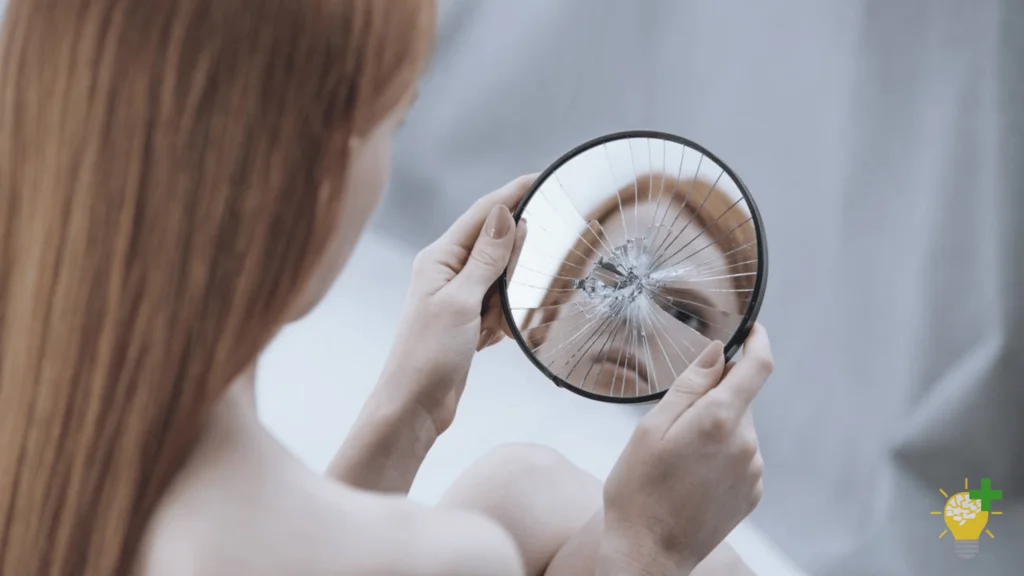Self-image is the mental picture you have of yourself ― how you perceive your traits, abilities, physical appearance, and even your beliefs and values. Do you now see why having a faulty view of yourself can easily affect nearly every aspect of your life?
If you struggle with low self esteem, a good place to start working on it is your self-image. And that’s exactly what this article is about. I explore ways to identify self image distortion and share some effective tips for correcting the problem and encouraging a positive body image.
Let’s dive right in.
What Does Self Image Distortion Look Like?
Have you ever looked in the mirror and felt like you don’t recognize the person staring back at you? That’s what self-image distortion is about a cognitive bias where our view of ourselves is completely skewed and inaccurate.
Keep in mind that self-image is not only about your thoughts and feelings concerning your body (or body image). It goes beyond physical appearance to encompass psychological, emotional, and social aspects.
If you have a distorted self image, you always think of yourself in a negative light. You usually fixate on your flaws or shortcomings while downplaying the areas where you shine.
You tell yourself things like:
- “I’m not smart enough.”
- “I’m a loser!”
- “I’m ugly.”
Worse still, you blow your perceived imperfections out of proportion, negatively impacting your self-esteem and confidence level.
How to Know You Have a Distorted Self Image

Here’s the tricky thing about having a distorted self image: it’s hard to recognize because you’re viewing yourself from a thwarted lens.
You must change your lens to see things clearly. To help you with that, here are 5 clear signs that your perception of yourself is inaccurate.
1. You Always Compare Yourself to Others
Occasionally feeling inadequate is normal; it happens to nearly everyone. However, if you constantly compare yourself to others and feel like you don’t measure up, you might have a skewed perception of yourself.
Feeling inadequate is just one of the ways self-comparison manifests. It might also show up as feeling envious of people’s achievements, appearance, or social status.
2. Your Inner Critic Just Won’t Quit
Your self-image may have taken a severe blow if you constantly put yourself down. There’s a high chance you’ve bought into the never-ending negative inner dialogue in your head, and this makes you focus on your flaws while ignoring your strengths.
And when the critical voice in your head has its way, you become constantly hard on yourself and may end up feeling not good enough.
3. You Struggle With Body Image Issues
Excessive concern about your physical appearance or obsessing over perceived flaws is an indication of body image issues.
Another strong indicator of poor body image is engaging in drastic measures to change your physical looks (body weight, body shape, facial features, or skin appearance).
4. You Are Obsessed With Perfectionism
Striving to get everything right on the first try might seem like a positive trait, but it could signal a problem with how you perceive yourself.
While reaching for excellence is great, setting impossibly high standards for yourself and feeling intense pressure to meet them is a sign of perfectionism. And perfectionism goes hand in hand with a distorted self image because it often leads to body dissatisfaction and constant self-criticizing behavior.
5. You Feel Uncomfortable in Social Settings
Do you feel like you don’t fit in? Are you obsessed with other people’s opinions of you? Or do you doubt your social abilities? These could be signs of a distorted self image affecting your social confidence.
Research shows that people with high social anxiety often struggle with self image distortion. In other words, you may have an inaccurate view of yourself if socializing makes you anxious.
How to Fix Self Image Distortion and Improve Self-Esteem

You might be tempted to beat yourself up if you notice any of the above signs, but resist that urge because it doesn’t help in any way.
A better approach would be to find healthy ways to correct the distorted view you have of yourself. In this section, I’ll share a few practical steps to help turn things around and bring about the desired change.
Doing the Internal Work
First, let’s look at the internal work you must do to correct any faulty perceptions you may have about your body, abilities, or social status.
Make Self-Reflection Part of Your Routine
Self-reflection may sound like a complex mental activity reserved for serious thinkers, but I’m pretty sure you did it (to some extent) before finding this article. It takes introspection or self-reflection to realize that your self-esteem needs work.
My point?
Self-reflection doesn’t have to be difficult. All it takes is carving out a few minutes daily, weekly, or however often you can explore your thoughts, feelings, beliefs, and actions.
Try to find out how these things contribute to your negative self-perception. This way, you can better determine exactly what you need to alter to create the change you want.
Challenge Your Negative Thoughts
Next, you want to pay attention to your self-talk. What is the voice in your head constantly telling you? Is it putting you down, pointing out your flaws, or making you feel unworthy?
Whenever you think and feel “less than,” stop and replace the disempowering thinking pattern and low self esteem with uplifting statements or affirmations.
However, you want to be careful not to tell yourself things you don’t believe.
While you should say nice things about yourself, you want to use realistic statements when challenging your negative thoughts.
For example, if you are not as good as your colleagues at specific tasks, and that makes you feel useless or pushes you into comparing yourself with them, replace those thoughts with statements like, “I may not be great at this, but I sure am good at many other things like….”
Challenging unhelpful thinking patterns with something more believable can boost your confidence and light up ways to improve your weaknesses.
Accept Who You Are
Correcting self-image distortion involves making peace with the real you, including all your flaws.
Truth is, no one is perfect, no matter how highly we think of them.
And it’s perfectly okay to have flaws, whether physical or psychological. Undoubtedly, it will take time to fully come to terms with this fact, but each time you spotlight your positive qualities, you strengthen your self-perception and increase your confidence.
Whenever you get the chance to introspect (I suggest you do so as often as possible), think of how your positive character builds your true worth rather than basing your self-worth on external circumstances.
Accepting who you are also means loving yourself and treating yourself with kindness, regardless of your perceived imperfections.
How exactly do you practice self-love? Here are a few suggestions:
- Celebrate your wins, big and small.
- Make time for your hobbies or interests.
- Do something solely for yourself at least once a month to demonstrate self-care.
Doing the External Work
As you do the inner work to overcome self image distortion, you must also put some time and effort into doing external work to ensure you don’t counteract the effect of your internal efforts. Consider the following helpful suggestions.
Be Mindful of Negative Influences
What are those things that make you feel less than? What activities do you engage in that trigger unnecessary self-comparison or self-bashing in you?
Take out time to really reflect on this, as it will help you identify negative influences that contribute to your self-image distortion.
Once you figure out these triggers, it is in your best interest to completely avoid them if possible or drastically limit your exposure to them.
In practical terms, this could mean:
- Unfollowing social media accounts that promote unrealistic beauty standards, especially if you have a negative body image.
- Staying away from people who always try to bring you down or make you feel inadequate.
- Avoiding news and media content that focuses too much on materialism.
Surround Yourself With Positive Influences
When you avoid negative influences, it creates a vacuum that must be filled. And the best way to do this is by surrounding yourself with the opposite of negative influence; positive people and content that can boost your mental health rather than spur on a distorted body image.
Start by seeking supportive friendships and relationships. You want to spend more time with family and friends who gently nudge you to believe in yourself, even when your confidence is low.
Also, make more time for consuming uplifting content. Need suggestions? Here are a few:
- Read good books that promote self-acceptance.
- Read positive quotes that inspire you to work on yourself.
- Visit online platforms that encourage body-positivity activities.
Final Thoughts
Self image dissatisfaction or distortion can limit you in many ways unless you take steps to correct it. Keep in mind that changing your views about yourself from negative to positive will take time, so be patient with yourself while you take baby steps to build your self-esteem.




